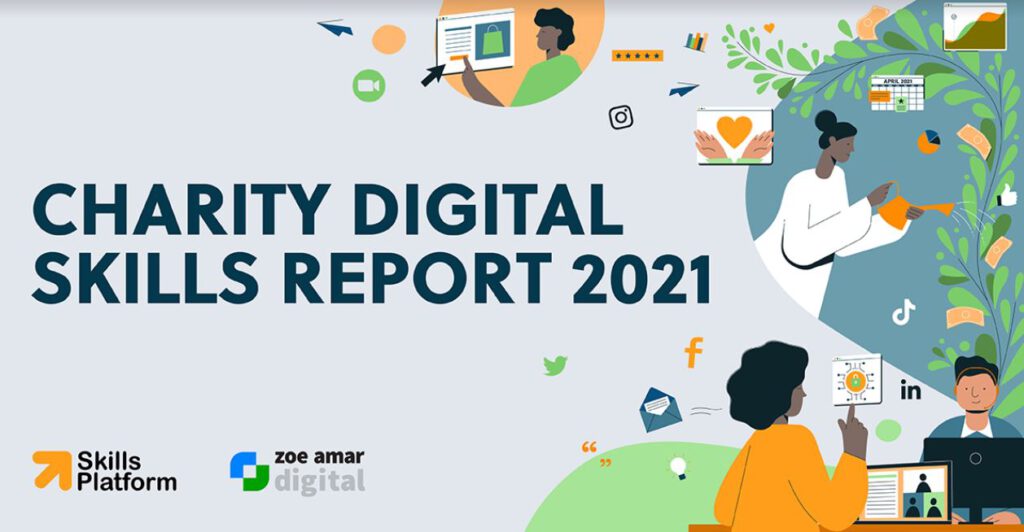Charity Digital Skills Report 2021: Charities have continued to adapt and have made strides in many areas

THE UK CHARITY SECTOR RISES TO THE DIGITAL CHALLENGE AMIDST ADVERSITY – THIS MOMENTUM MUST CONTINUE
More than a year on from the start of the pandemic, charities have shown innovation and agility, adapting quickly to mobilise or accelerate digital progression.
Results from this year’s Charity Digital Skills Report 2021 reveal charities have continued to adapt and have made strides in many areas. However, it also highlights the need to invest in the future to maintain momentum and ensure the digital progress achieved is sustainable and changes embedded.
This year’s report reveals 70% of charities have seen an increased demand for their services and 83% have started offering online services in response to demand. Close to 8 out of 10 (78%) have also used digital to reach new audiences. However, whilst there have been improvements in digital service delivery, there is still some way to go. 47% rate themselves as fair and 28% as poor, compared to 43% and 40% for these categories last year.
Basic digital skills have considerably improved
Basic digital skills have considerably improved across the sector with charities including The Scouts, The Leprosy Foundation and Nordoff Robbins sharing how the pandemic has spearheaded or accelerated their digital progress. They clearly demonstrate how the sector has had to respond to the pandemic in an agile way and develop the fundamental digital skills and capabilities needed to survive. The number of charities rating themselves as having excellent basic digital skills has almost doubled this year, with 56% putting themselves in this category compared to 29% last year. The next step for charities is to build on these basic skills and take it to the next level, including learning how to use data more effectively and improving digital fundraising skills in particular.
Another marker of progress is that 60% of charities report they now have a strategy in place for digital.
This is a very positive increase of 11% from 2020 and marks the biggest improvement in this area since the report began. There are also signs that more charities are confident they have advanced with digital. 16% say it is integral to their organisational strategy and embedded in everything they do. Equally, it is encouraging to see over two thirds (67%) now see it as a priority for their organisation, with similar numbers planning investment in digital infrastructure.
This year’s report certainly highlights many positives of charities adapting their services digitally, but it does highlight digital inclusion as a key challenge. Charities are concerned digitally excluded service users are now even more isolated. Over half (52%) are worried about excluding some people or groups, and 27% say they need more support around digital inclusion. 24% are concerned that their audience is not online and even 12% of charities themselves have struggled with basic tech access, with almost half (45%) having to provide their users with devices, data or support to get online or access services.
Responses to remote working must also be considered carefully.
Just over two thirds (67%) continue to deliver all work remotely, however, remote working has been cited as the second greatest challenge of the pandemic. 38% of charities say they have found remote working challenging, exhausting or isolating and just under a third (31%) say their staff are burned out from demands of intense remote working. Charities need to ensure they improve remote working so colleagues’ wellbeing is a priority. Whether it’s limiting the amount of time staff spend on video calls, mandating time off or changing expectations of colleagues, this will make work much more effective, productive and motivating for everyone.
Looking at the future of working and digital, funders need to up their game.
Almost half (47%) of charities want to include core digital costs in all applications and there is a clear need for additional support from funders, such as guidance and training. IT is now the biggest barrier for charities’ digital progress and this requires significant investment; funders have a vital role to play here. Equally, for the third year running, charities have said their most important need from their leadership team is a clear vision for digital. Leaders either need to provide one or must seek out training and support needed to help them develop this.
Zoe Amar, Director and Zoe Amar Digital, comments:
“There have been some very positive developments as we look to emerge from the pandemic. Basic digital skills are improving and we are now seeing more charities taking a strategic approach. Charities are also making digital more of a priority generally and are planning to invest further in the coming year. However, digital inclusion, burnout from remote working and poor IT are still key barriers. Furthermore, digital fundraising, data use, service development and developing an online presence are significant areas for development. Across the sector, foundations need to be put in place, including skills, infrastructure and taking an inclusive approach to technology.”
Gilly Challinor Head of Network Delivery, CAST, adds:
“The past year has really highlighted and exacerbated the digital divide, where people who were already online prior to COVID could continue to access many charity services. But those people who were previously digitally excluded could no longer access the crucial face to face support from charities that they had relied on before. Ensuring charities can reach the most vulnerable communities when digital service delivery is on the increase is a pressing need. As the sector moves to digital service delivery more and more, we must intentionally watch out for people we could be leaving behind.”
Jamie Ward-Smith, Chair of Co-op Foundation, says:
“It’s encouraging to see how the sector has adapted and embraced digital during the past year, with basic digital skills improving, and digital strategy becoming more of a priority. Despite this, digital skills remain to be a significant challenge, alongside a clear need to improve access to digital resources for service users. The past year has been a wake-up call for our sector, and while it has responded really well, more support from funders is needed if we are to maintain momentum in the digital space. Only by working together as funders can we achieve this and enable the step change that’s needed.”
Vicky Browning, CEO of ACEVO, concludes:
“Throughout the pandemic, we’ve seen charity leaders making innovative use of digital in their organisations to adapt their services and keep reaching the communities they serve. The Charity Digital Skills report shows that there is a clear appetite for stronger digital leadership, with 52% of charities saying they would like CEOs and boards to provide a clear vision of what digital could help them achieve. We encourage all charity leaders to explore with their boards and teams how to embed inclusive digital working in strategic planning.”
To read the complete Charity Digital Skills Report 2021, along with sector responses, visit: https://report.skillsplatform.org/charity-digital-report-2021











Responses